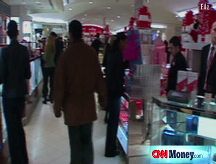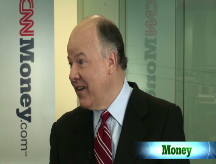Stocks fight back
Wall Street ends a volatile session with gains. HP's forecast and Congressional hearings are in focus.
NEW YORK (CNNMoney.com) -- Wall Street ended a volatile session higher Tuesday, as stocks dropped to within a few points of 2003 levels and then bounced back.
The Dow Jones industrial average (INDU) gained 1.8%. The Standard & Poor's 500 (SPX) index gained 1% and the Nasdaq composite (COMP) ended little changed.
Stocks seesawed throughout the day, spiking after officials said the $700 billion bailout was helping and slumping after another brutal housing market report.
Homebuilders' confidence in the housing market fell to a record low in November, according to a National Association of Home Builders (NAHB) report released Tuesday afternoon. Confidence fell to 9 on a scale of 1 to 100, the worst its been since NAHB began tracking the index in 1985.
The collapse of the housing market and subprime mortgage fallout fed the credit crisis and exacerbated the economic slowdown.
"The report reminds us that the main problem for the economy is real estate," said Art Hogan, chief market analyst at Jefferies & Co.
Tuesday's swings were also reflective of the volatility that has become commonplace in the market.
Hogan said that as an example, the average intraday volatility on the S&P 500 going back to 1962 has been around 1.5%, but in the month of October, it was 6.7%. In November it has been more than 5%. That percentage move reflects the swing between the highs and lows of the day, such as last Thursday, when the Dow seesawed 911 points in one session.
"We're seeing more volatility than there's ever been," Hogan said.
Wednesday's economic news includes reports on consumer prices, building permits and housing starts and the minutes from the last Federal Reserve policy meeting.
Congressional hearings: Stocks hit the highs of the session Tuesday after Treasury Secretary Henry Paulson, Fed Chairman Ben Bernanke and FDIC Chairman Sheila Bair told a House committee that the bailout has helped stabilize financial markets, despite the recent criticism. (Full story).
After all the recent dour news on the economy, investors "were probably relieved that the officials were saying something positive," said Kenny Landgraf, principal and founder at Kenjol Capital Management.
However, investors remain concerned about what will come out of the current Senate hearing on the automakers. General Motors (GM, Fortune 500), Ford Motor (F, Fortune 500) and Chrysler say they need an additional $25 billion on top of the $25 billion they have have already received from the government in order to stay afloat.
But critics say the $25 billion is just a stop-gap measure that doesn't solve the underlying problems the industry is facing. They would rather see the company file for bankruptcy, restructure and reemerge a leaner company. (Full story)
Company news: Hewlett-Packard (HPQ, Fortune 500) forecast fiscal fourth-quarter profit that was above analysts' forecasts, despite the sagging economy. HP also lifted its fiscal 2009 forecast. Shares jumped 14.5%.
HP's forecast was welcome news for tech investors after both Intel (INTC, Fortune 500) and Cisco (CSCO, Fortune 500) warned about weaker sales in the current quarter. But it failed to make a dent in the broader stock investor pessimism.
Also helping the technology sector was news that Yahoo (YHOO, Fortune 500) co-founder Jerry Yang will give up the CEO spot as soon as a replacement is found.
Yahoo gained after announcing that co-founder Jerry Yang will step down as CEO as soon as a replacement is found, raising speculation that Microsoft (MSFT, Fortune 500) could show renewed takeover interest.
Home Depot (HD, Fortune 500) reported weaker quarterly sales and earnings that nonetheless topped forecasts. The retailer also warned that annual earnings per share will plunge 24% from a year ago, due to the anemic consumer spending environment. Yet, investors focused on the positive and the stock rose 3.6%.
Citigroup (C, Fortune 500) plunged 6% as it said that it sees consumer credit losses spiking through the first half of next year. On Monday, the company said it is cutting at least 50,000 jobs, or 20% of its workforce, as it struggles to cut costs.
Market breadth was negative. On the New York Stock Exchange, losers beat winners three to two on volume of 1.6 billion shares. On the Nasdaq, decliners topped advancers three to two on volume of 2.44 billion shares.
Economy: The day's economic news added to bets that the recession is going to drag on for some time.
Home prices plummeted in the third quarter by a record 9% versus a year ago, amid a flood of foreclosures. On the upside, bargain hunters have been scooping up properties in some of the hardest-hit areas.
A separate report showed that inflationary pressures remain moderate. Wholesale prices posted the sharpest monthly decline on record in October due to the collapse in oil prices over the last four months. But prices excluding food and energy, the so-called "core" reading, rose more than expected.
Other markets: In global trading, Asian markets tumbled, while European markets ended higher.
The dollar gained versus the euro and the yen.
COMEX gold for December delivery fell $9.30 to settle at $732.70 an ounce.
U.S. light crude oil for December delivery fell 56 cents to settle at $54.39 a barrel on the New York Mercantile Exchange, the lowest close since January 2007.
Gasoline prices dipped another 1.9 cents to a national average of $2.068 a gallon, according to a survey of credit-card activity released Tuesday by motorist group AAA. The decline marks the 62nd consecutive day that prices have decreased. During that time, prices dropped by $1.78 a gallon, or 46.3%.
Bonds: Treasury prices gained, lowering the yield on the benchmark 10-year note to 3.52% from 3.65% late Friday. Treasury prices and yields move in opposite directions. (Full story)
The yield on the 3-month Treasury bill, seen as the safest place to put money in the short term, rose to 0.11% from 0.08% Monday, with investors preferring to take a piddling return on their money than risk the stock market. In September, the 3-month yield reached a 68-year low around 0% as investor panic peaked.
Borrowing rates were little changed from the previous day, with the credit market continuing to stall after a month long improvement. The 3-month Libor rate fell to 2.22% from 2.4% Monday, while overnight Libor was unchanged at 0.4%, according to Bloomberg.com. Libor is a key bank lending rate. ![]()




